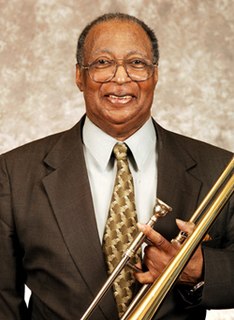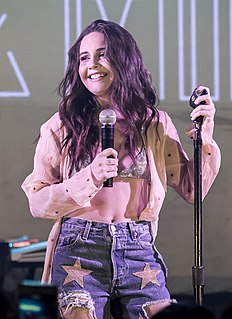A Quote by Jon Gordon
[Charlie Parker] was kind of a sponge and intrigued by it all.That's similar to what Phil [Woods] told me about Bird, too. Like he was into cooking. He was just into a lot of things. Yeah, it's about dealing with bebop and jazz and Trane [John Coltrain] and post-Trane and knowing the history. But you've got to live. You have to experience things. Know something in this world. So it was a very deep education about what it means to try and be an artist.
Related Quotes
[Charlie "Bird" Parker] would sit down and ask [Phil Wood], "What do you think about this whole secondary Viennese school with Schoenberg, Berg and Webern? Are you listening to that music and what do you feel about it?" These were the conversations that he was having. And he also said, what he learned from Charlie Parker was, not that he studied with him in the formal sense, is that the first thing that Charlie Parker would always ask was, "Did you eat today?".
By the latter part of high school, by the middle of junior year in high school, Jay Rodriguez played me some Irakere records that that Paquito [D'Rivera] was on. And he also played me and our friend, Curtis Haywood, some Phil Woods records. And when I heard Phil, I just about lost my mind. I was playing the Charlie Parker Omnibook as part of my lessons. This was the '80s. There was no YouTube and all that. And we had three or four jazz records at that point.
It was Miles Davis who took me to New York, and Coltrane was in the band, as well as Paul Chambers, Philly Jo Jones. 'Trane took me aside, and, of course, we did Blue Trane, which was my first album-and that started everything. He had confidence that I didn't have; he saw something that I didn't see.
I can't have discussions about it anymore, I just can't. When someone asks me if I've found Jesus, I say, 'Yeah, I saw him at a Nirvana concert a couple of years ago.' It's like, Jesus has got things to do, he's got a ten o'clock. He's not going to fix things for me, I have to fix things for myself, so I try and have a sense of humor about it and nobody finds my humor very amusing. We've just got to lighten up on the savior bit, folks. You know, get off the cross, we need the wood.
In those days before hearing Charlie Parker and Dizzy, and before learning of the so-called bebop era--by the way, I have some thoughts about that word, "bebop"--my first jazz hero ever, jazz improvisor hero, was Lester Young. I was a big "Lester Young-oholic," and all of my buddies were Lester Young-oholics. We'd get together and dissect, analyze, discuss, and listen to Lester Young's solos for hours and hours and hours. He was our god.
I definitely write about things that are universal, that everyone can identify with. You're supposed to write about things you're passionate about and I guess I am a foodie. I do love food and it's kind of like I'm an eccentric observationalist guy. To make it kind of universal, I try a lot of different things. When I first started writing this, I was like, 'No food.' Then, you know, it just always goes there.
I don't think he was knowable. I mean, when most people talk about knowing somebody a lot or a little, they're talking about the secrets they've been told or haven't been told. They're talking about intimate things, family things, love things," that nice old lady said to me. "Mr. Hoenikker had all those things in his life, the way every living person has to, but they weren't the main things with him.
I always wanted to have a young female artist that would tell me the truth about life and not only talk about the good things or the things that were exciting or interesting but also talk about the things that people in general are skeptical to talk about- the bad things that do happen. A good 50% of our lives is things that are happening that we're not necessarily super thrilled about and I feel like that's missing from pop music a lot of the time so my main goal is to be truthful about everything and not just specific things.
You can say a lot of bad things about Tiny Cooper. I know, because I have said them. But for a guy who knows absolutely nothing about how to conduct his own relationships, Tiny Cooper is kind of brilliant when it comes to dealing with other people's heartbreak. Tiny is like some gigantic sponge soaking up the pain of lost love everywhere he goes.
Russian people really don't like it when somebody does horrible things in Russia, and then can calmly go travel to another country and spend time there. And this is what needs to be done: the Russian people need to be told this, because in today's world, just doing something is not enough. You've got to tell about it, too. If you've done something and haven't told about it, it's as good as if you hadn't done it at all.






























